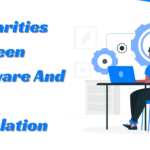Enhancing Your Business Workflow with Advanced IT Solutions
In today’s fast-paced business environment, staying ahead of the competition means integrating innovative technology into your daily operations. Harnessing advanced IT solutions can streamline workflows, enhance productivity, and boost overall efficiency. Understanding the latest trends and tools in the IT landscape is crucial for maintaining a competitive edge.
As a business owner or manager, you know that the right technology can significantly affect how smoothly your operations run. Implementing state-of-the-art IT solutions saves time, reduces costs, and increases profitability. This article explores various advanced IT tools and strategies that can help you enhance your business workflow.
Advanced Strategies That Enhance Your Business Workflow

Maximizing Efficiency with Cloud Computing
One of the most transformative technologies for businesses today is cloud computing. By leveraging cloud services, you can access data and applications from anywhere. This flexibility allows for more efficient collaboration among team members, regardless of their physical location. In addition to improved accessibility, cloud computing offers robust security features such as ransomware protection services, ensuring your data is safeguarded against cyber threats.
Cloud computing also reduces the need for physical hardware, which can be costly and require regular maintenance. By migrating to the cloud, you can save on infrastructure costs while benefiting from automatic software updates and scalability options that grow with your business needs. Furthermore, cloud service providers often offer comprehensive disaster recovery plans to ensure business continuity in case of unexpected events.
The adoption of edge computing, an extension of cloud technology, further revolutionizes business operations. By processing data closer to its source, edge computing reduces latency and enables real-time decision-making. This is particularly beneficial for industries requiring immediate data processing, such as manufacturing or logistics.
Edge computing also enhances privacy and compliance by keeping sensitive data local and addressing concerns in highly regulated sectors. As businesses continue to generate vast amounts of data, combining cloud and edge computing provides a robust framework for efficient data management and analysis.
Streamlining Tasks with Artificial Intelligence
Artificial intelligence (AI) has transformed businesses’ operations by automating repetitive tasks and providing valuable insights through data analysis. For instance, AI-powered chatbots can handle customer inquiries around the clock, freeing your staff to focus on more complex issues. In addition to improving customer service, AI can optimize supply chain management by predicting demand patterns and adjusting inventory levels accordingly.
Moreover, AI-driven analytics provide deeper insights into customer behavior and market trends, enabling you to make data-driven decisions that enhance overall business strategy. By integrating AI tools into your workflow, you can achieve higher efficiency and productivity while staying ahead of industry developments.
Integrating machine learning, a subset of AI is taking business process automation to new heights. Machine learning algorithms can identify patterns and make predictions with increasing accuracy over time, leading to more refined and efficient workflows. For example, machine learning models in financial services can detect fraudulent transactions more precisely, reducing false positives and streamlining the verification process.
In manufacturing, predictive maintenance powered by machine learning can anticipate equipment failures before they occur, minimizing downtime and reducing maintenance costs. As these technologies continue to evolve, businesses that harness the power of machine learning will be better positioned to optimize their operations and stay competitive in their respective markets.
Enhancing Communication with Unified Communications Systems
Effective communication is vital for any successful business. Unified communications systems combine various communication channels into a single platform, such as voice calls, video conferencing, instant messaging, and email. This integration simplifies communication processes and ensures all team members are on the same page.
Unified communications systems also support remote work by enabling seamless interaction between employees working from different locations. With features like screen sharing and virtual meeting rooms, teams can collaborate as effectively as they would in a traditional office setting. Moreover, these systems often include advanced security measures to protect sensitive information exchanged during communications.
Integrating artificial intelligence into unified communications systems further enhances their capabilities. AI-powered features such as real-time language translation, voice-to-text transcription, and sentiment analysis are breaking down communication barriers and providing valuable insights. For instance, AI can analyze the sentiment of customer interactions, helping businesses identify areas for improvement in their customer service.
Also, intelligent scheduling assistants can streamline organizing meetings by automatically finding suitable time slots based on participants’ availability. These AI-enhanced unified communications tools improve efficiency and contribute to a more inclusive and productive work environment, especially in global organizations dealing with diverse teams across different time zones and languages.
Securing Data with Advanced Cybersecurity Measures
In an era where cyber threats are increasingly sophisticated, protecting your business data is more critical than ever. Advanced cybersecurity measures such as multi-factor authentication (MFA), encryption, and intrusion detection systems (IDS) can significantly reduce the risk of data breaches. Implementing these technologies ensures that only authorized personnel have access to critical information.
Additionally, regular cybersecurity training for employees is essential to create a culture of awareness and vigilance within your organization. By staying informed about the latest cyber threats and adopting best practices for online safety, you can mitigate potential risks and maintain the integrity of your business operations.

















